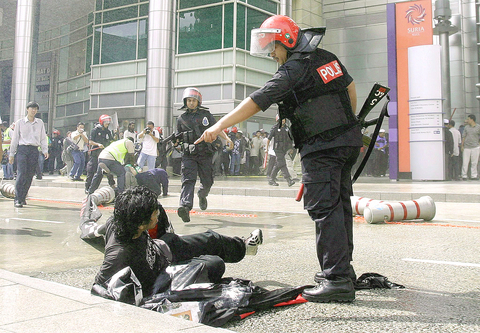Malaysian police used batons and water cannons yesterday to disperse hundreds of protesters at Kuala Lumpur's iconic Twin Towers, arresting more than 20 and beating several as stunned shoppers looked on.
Some 400 people, including trade unionists, opposition parties and non-government organizations, had gathered at an upmarket shopping mall at the Twin Towers for the latest in a series of rallies against fuel price rises since the government sharply raised prices on Feb. 28.
The protesters were met by over 400 police, including officers with dogs and on horseback.

PHOTO: EPA
Police in riot gear wielding batons and rifles were also seen in formation, while two water cannon trucks stood ready.
Shouting anti-government slogans and holding floating black balloons to symbolize oil and inflation, the protesters demanded that the government reverse the price increases.
Limit
"When the petrol price goes up, all our essential goods go up," said K. Brabakarun, a vice president from the Malaysian Trades Union Congress, the main protest organizer.
"There's a limit. Workers can't afford a price increase against their salaries so we are telling the government," he said.
The trade union and other organizations will deliver a memorandum to Prime Minister Abdullah Badawi today over the issue, Brabakarun said.
The rise has sparked public anger. Abdullah's administration has pleaded for public understanding, citing high global oil prices.
Defiant
Crowd numbers at the rallies during the month have been dropping, but protesters have become increasingly defiant.
Chaotic scenes ensued as the demonstrators followed a police call to disperse, but then marched further down the street to continue the rally before heading back to the Twin Towers.
Police then used a water cannon to disperse demonstrators, who scrambled across a paved forecourt in front of the towers to continue their rally.
For over two hours protesters repeatedly dispersed to mingle with onlookers.
However, they later gathered again in small groups near the towers only to be chased by police.
Police finally pointed a water cannon at shocked shoppers and tourists outside the Twin Towers and at an exclusive mall across the street to clear the roads, before the protest petered out.
Kicked and beaten
Several protesters were seen being beaten and kicked by police before being handcuffed and arrested.
Deputy district police chief Rodzi Ismail said more than 20 had been arrested. However, police were still confirming the number of arrests.
A leader in the opposition Islamic PAS party, Hatta Ramli, and two of his daughters were among those arrested.
"What the police have done today is to show the government is desperate to disperse all these forms of demonstrations so we must go on to fight," said Zulkifli Ahmad, an Islamic PAS official.

Auschwitz survivor Eva Schloss, the stepsister of teenage diarist Anne Frank and a tireless educator about the horrors of the Holocaust, has died. She was 96. The Anne Frank Trust UK, of which Schloss was honorary president, said she died on Saturday in London, where she lived. Britain’s King Charles III said he was “privileged and proud” to have known Schloss, who cofounded the charitable trust to help young people challenge prejudice. “The horrors that she endured as a young woman are impossible to comprehend and yet she devoted the rest of her life to overcoming hatred and prejudice, promoting kindness, courage, understanding

US President Donald Trump on Friday said Washington was “locked and loaded” to respond if Iran killed protesters, prompting Tehran to warn that intervention would destabilize the region. Protesters and security forces on Thursday clashed in several Iranian cities, with six people reported killed, the first deaths since the unrest escalated. Shopkeepers in Tehran on Sunday last week went on strike over high prices and economic stagnation, actions that have since spread into a protest movement that has swept into other parts of the country. If Iran “violently kills peaceful protesters, which is their custom, the United States of America will come to

‘DISRESPECTFUL’: Katie Miller, the wife of Trump’s most influential adviser, drew ire by posting an image of Greenland in the colors of the US flag, captioning it ‘SOON’ US President Donald Trump on Sunday doubled down on his claim that Greenland should become part of the US, despite calls by the Danish prime minister to stop “threatening” the territory. Washington’s military intervention in Venezuela has reignited fears for Greenland, which Trump has repeatedly said he wants to annex, given its strategic location in the arctic. While aboard Air Force One en route to Washington, Trump reiterated the goal. “We need Greenland from the standpoint of national security, and Denmark is not going to be able to do it,” he said in response to a reporter’s question. “We’ll worry about Greenland in

PERILOUS JOURNEY: Over just a matter of days last month, about 1,600 Afghans who were at risk of perishing due to the cold weather were rescued in the mountains Habibullah set off from his home in western Afghanistan determined to find work in Iran, only for the 15-year-old to freeze to death while walking across the mountainous frontier. “He was forced to go, to bring food for the family,” his mother, Mah Jan, said at her mud home in Ghunjan village. “We have no food to eat, we have no clothes to wear. The house in which I live has no electricity, no water. I have no proper window, nothing to burn for heating,” she added, clutching a photograph of her son. Habibullah was one of at least 18 migrants who died